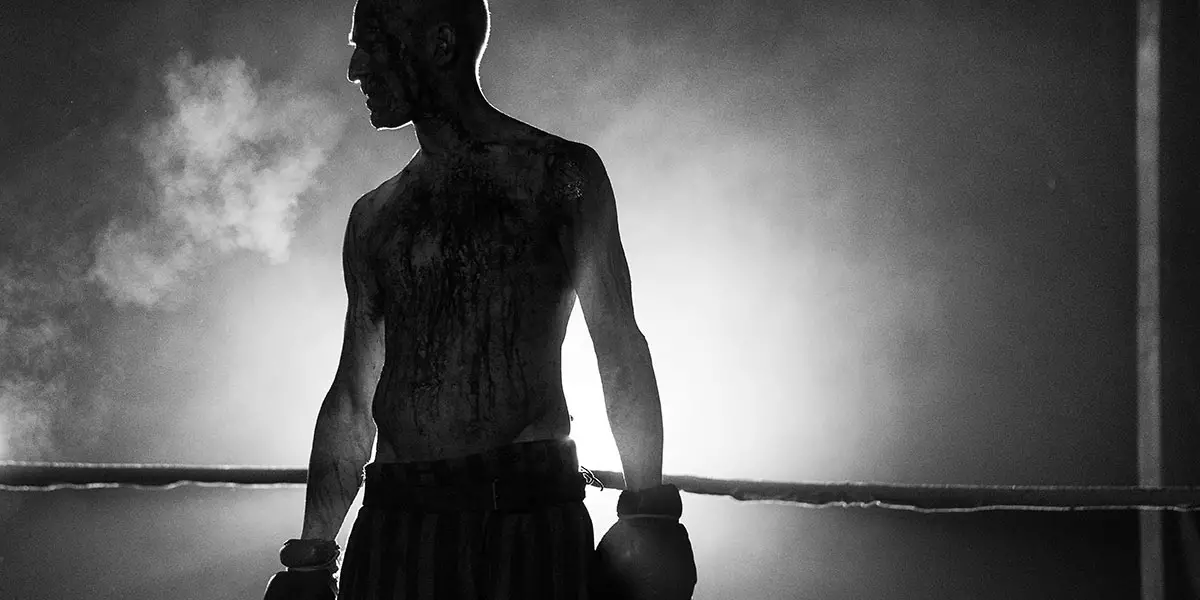
Ben Foster turns in a career-defining performance in Barry Levinson’s new film, The Survivor, based on the life of Harry Haft.
While many perished at Auschwitz, Harry Haft (Ben Foster) found the will to survive. Not so much because of boxing for the Nazis’ amusement–including Nazi camp commander Dietrich Schneider (Billy Magnussen)–but because he wanted to reunite with his girlfriend, Leah (Dar Zuzovsky). If not for boxing, it’s doubtful Harry would have lived. But this being said, boxing also brings about great shame. Shame for killing other Jewish prisoners through boxing including his friend, Jean. Along the way, he escapes and makes it to safety in New York where he takes his boxing to the next level. Ultimately, Harry finds himself facing off against Rocky Marciano in the boxing ring. However, this bout would be the one that ends his boxing career. Considering how it started, that’s not a bad way to call it a day.
While boxing may bring Harry some fame, all he wants to do is see Leah again. He does not know if she is alive or not–the last time Harry saw her was when the Nazis took her away in 1941. His search brings him to the Displaced Persons Service where he meets his future wife, Miriam Wofsoniker (Vicky Krieps). Where Harry is still living in the past, his brother, Peretz (Saro Emirze), is looking towards a brighter future. Harry saved Peretz’s life in the camps and this is something that affects Peretz for the rest of his life, even when sports journalist Emory Anderson (Peter Sarsgaard) enters the picture.
A lot of Holocaust survivors were not open about their experiences for much of their post-Holocaust years. This began to change with the release of Schindler’s List in 1993 and the start of the USC Shoah Foundation shortly thereafter. If not for the USC Shoah Foundation, many survivors would probably have died without telling their stories. In watching this film, you certainly couldn’t blame them. It’s something that came to mind while watching the movie and during my conversation with Barry Levinson, Ben Foster, and Vicky Krieps. The camps were such a horrifying experience that one doesn’t need to wonder Harry Haft was reluctant to share his story. All you need to do is take a look at his nightmares and all the events triggering flashbacks to the camps.
Oscar-winning director Barry Levinson is one of the finest filmmakers in cinematic history. He’s back here with another gem of a film. Honestly, Levinson should find himself in another Oscar race. This film is certainly up there with some of his best work. I’d also say that it is certainly in the top tier. The film can be tough to watch at times but this just comes with the territory. Holocaust films can certainly be intense and this film is no exception. Justine Juel Gillmer’s script–based on Harry Haft: Survivor of Auschwitz, Challenger of Rocky Marciano by Alan Scott Haft–finds a way to balance the terror of the camps and the post-war drama. This isn’t an easy feat by any means but the script captures the trauma that many survivors experience.
What qualifies Levinson for the job is that his uncle survived the camps. Because of this, he is no stranger to seeing someone experiencing the same nightmares every night. This kind of trauma never goes away and again, it’s why so many survivors didn’t open up for many years. Levinson brings his experience to his direction of the film. In doing so, he gets one heck of a performance out of his leading star, Ben Foster.
I’ve seen some fine work from Ben Foster over the years. What I can tell you is that Ben Fosters delivers one of the best performances this year. To say that the work in The Survivor is the best performance in his career wouldn’t be an understatement! Foster transforms himself for the role and goes above and beyond to depict the emotional trauma that it requires. He portrays Haft during three different periods of his life–the camps, post-war, and in 1963. If you’re wondering, no, that’s not CGI de-aging. Foster dedicated himself to the required transformation for the role. Because of this, he lost 60 pounds before regaining the weight for later parts of the film! You cannot leave Toronto or virtual TIFF without watching Foster’s Oscar-worthy performance. I’m still thinking about his work a few days after watching the film.
Aesthetically, I love that Levinson and cinematographer George Steel go with handheld black-and-white footage for the camps. Maybe it’s because of having seen Schindler’s List but I find that this decision works in recreating the era. Levinson himself is no stranger to period films especially with his Baltimore tetralogy of films. Production designer Miljen ‘Kreka’ Kljakovic also goes to great lengths to recreate both Auschwitz and Jaworzno. Meanwhile, the score from Hans Zimmer feels subtle compared to his recent work on action films but it’s nevertheless effective.
We need The Survivor now more than ever. Worldwide Jewry may be the highest it’s been since the years before the Holocaust but antisemitism is a plague that does not want to go away. Look at what’s happened this summer with Jew-hatred. As Marciano’s corner man Charlie Goldman (Danny DeVito) comments in the film: “We’re always the fucking punching bag.” And despite this, we continue to persevere. Even now, Jews are fighting back against the hate especially online. This film is one of four Holocaust-era films playing TIFF this year. It goes without saying: if we do not remember our history, we’re doomed to repeat it.
DIRECTOR: Barry Levinson
SCREENWRITER: Justine Juel Gillmer
CAST: Ben Foster, Vicky Krieps, Billy Magnussen, Peter Sarsgaard, Dar Zuzovsky, with John Leguizamo and Danny DeVito




